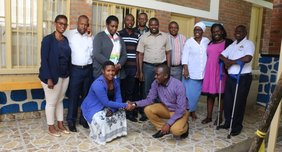From from 30 October – 3 November 2017, The National Council of Persons with Disabilities in collaboration with Federation Handicap International/Rwanda are elaborating the Community Based Inclusive Development (CBID) Guidelines in a local Rwandan context. The main objectives of CBID is to promote and improve the strategies of the rehabilitation services for people with disabilities, ensuring their participation and inclusion in society enhancing the quality of life of PWD within general community development for the rehabilitation, equalization of opportunities, poverty reduction and social inclusion of people with disabilities. The CBID is composed in different component:
Health care component
The PWD have the rights of access to the health services, the goals of CBID is to ensure that persons with Disabilities in Rwanda work closely with the community and health sectors at all levels to ensure that the needs of persons with disabilities and their families are addressed in all elements of health, The elements of health component include health promotion, prevention, Health care, rehabilitation, and assistive devices.
Education component
The role of CBID in education is to work with the education sector to help every institutions to make inclusive education at all levels, and to facilitate access to education and lifelong learning for persons with disabilities.All persons with disabilities have access to learning and resources that meet their needs and respect their rights.Persons with disabilities are involved in education as role-models, decision-makers and contributors.This systematic of advocacy at all levels are obliged to make national policies comprehensive to facilitate inclusive education.
Component of livelihood
Persons with disabilities have equal access to earning a living through wage employment. The role of CBID is to enable persons with disabilities to access and retain wage employment, by working to increase equal access and treatment in the workplace, as well as access to services that lead to wage employment. All institutions will raise awareness about the work potential and right to employment of persons with disabilities and assist persons with disabilities to find jobs .
Social component
PwDs have meaningful social roles and responsibilities in their families and communities, and are treated as equal members of society. PwDs have meaningful social roles and responsibilities in their families and communities, and are treated as equal members of society and the full participation of PwDs in the social life of their families and communities.
The current CBID will be limited to the following core elements like: Personal assistance, Relationship, marriage and family, Culture and arts, Recreation, leisure and sports, Justice.
Component of empowerment
The role of CBID is to provide support and assistance to Persons with Disabilities and their families as self-help groups and sustain existing, so that , the role of CBID is to promote the inclusion of Persons with Disabilities and their family members.
In communities where CBID programmes and Persons with Disabilities’s organizations coexist, they need to work together. Where Persons with Disabilities’s organizations do not exist, CBID programmes are encouraged to support their formation at the community level; this element covers how they can do this effectively. The role of CBID is to work in partnership with PWD’s organizations and provide assistance when requested CBID programmes and Persons with Disabilities ’s organizations will work together to ensure the implementation of the Convention on the Rights of Persons with Disabilities and community- based inclusive development. In his closing remarks Emmanuel NDAYISABA the Executive Secretary of NCPD thanked the team who elaborate this document and request every to do his best in order to practice the theories.

